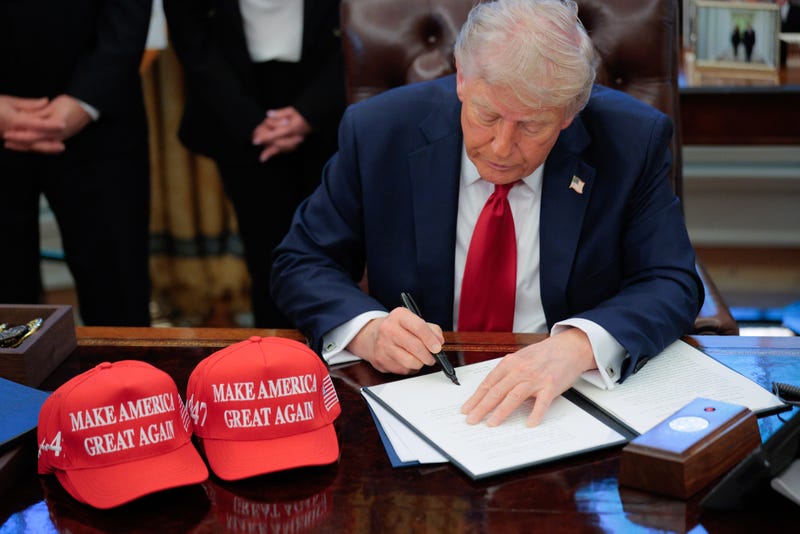
The Trump administration escalated its showdown with Democratic-led states and cities over immigration enforcement on Monday, announcing that the president will sign executive orders that will “unleash America’s law enforcement to pursue criminals” and direct federal agencies to publish a list of “sanctuary cities” that do not cooperate with immigration agents.
Minneapolis Mayor Jacob Frey says President Donald Trump is wrong and told Vineeta Sawkar on the WCCO Morning News says that it would be against Minnesota state law, and is also a violation of a separation ordinance between the city and the federal government.
"Look, I'm the mayor of this city and my responsibility is to make sure that people are safe and I want our officers, I want them stopping violent crime," Frey explains. "I don't want our officers spending a single second assisting someone who's undocumented, and that's the only issue."
Mayor Frey says that the Minneapolis police department has more important things to do and adding immigration enforcement duties would be unsafe for the city.
"I'll just ask kind of the, the basic question like what's more dangerous? A serial killer who's on the loose or a guy that's just dropping his kids off at school and then going to work a landscaping job? There are more important things that we need our officers to do and we're able to prioritize that," Frey said.
The Minneapolis mayor also points out that Trump's plan for an executive order to have local agencies assist the FBI is a violation of the city's long-time separation agreement with the federal government. That agreement stipulates that Minneapolis police officers don't get involved with the enforcement of federal immigration laws. It also bars the MPD from collecting information that determines whether someone is in the U.S. illegally.
White House Press Secretary Karoline Leavitt described the sanctuary city executive order in a morning news briefing as “focused on protecting American communities from criminal aliens.”
“This president is trying to simply enforce our nation’s immigration laws and is facing roadblock after roadblock,” Leavitt said. “... We’re going to continue to forge ahead with this mass deportation campaign.”
The order, she said, will direct the attorney general and secretary of Homeland Security to publish a list of state and local jurisdictions that “obstruct the enforcement of federal immigration laws.”
“It’s quite simple,” Leavitt said in the briefing with border czar Tom Homan. “Obey the law, respect the law, and don’t obstruct federal immigration officials and law enforcement officials when they are simply trying to remove public safety threats from our nation’s communities.”
Trump is focusing on immigration — a key platform of his 2024 election campaign — as he approaches his 100th day in office. On Monday, the White House erected a line of placards around its lawn featuring mug shots of 100 people taken into custody by Immigration and Customs Enforcement.
“ARRESTED” the signs said above a photograph and a list of the crimes they had allegedly committed, from murder to rape to distribution of fentanyl.
After the two executive orders are signed, Leavitt said, the president will have signed more than 140 executive orders in three months, a number that she described as “rapidly approaching the total number signed by the Biden administration over the course of four years in office.”
But the administration is already running into legal roadblocks as it seeks to penalize sanctuary cities.
Last week, a federal judge in California barred the Trump administration from denying or conditioning the use of federal funds to San Francisco and more than a dozen other municipalities that limit cooperation with federal immigration enforcement.
U.S. District Judge William Orrick said that parts of Trump’s executive orders were unconstitutional, and that the defendants are prohibited “from directly or indirectly taking any action to withhold, freeze, or condition federal funds.”
“Trump already tried this, and he failed because it’s unconstitutional,” Los Angeles City Councilmember Hugo Soto-Martínez said in a statement. “This is just another scare tactic to get us to follow his authoritarian agenda — but it’s not going to work.”
As a blue state with the largest population of undocumented immigrants in the U.S., California is a key player in the nation’s immigration showdown.
Last week, the Trump administration sued the city of Rochester, N.Y., arguing its sanctuary city policies violate the Constitution by impeding immigration enforcement. On Friday, FBI agents arrested Hannah Dugan, a county judge in Milwaukee, accusing her of obstructing an immigration arrest. Asked if the Trump administration would lock up a federal judge or a Supreme Court justice, Leavitt said: “Anyone who is breaking the law or obstructing federal law enforcement officials from doing their jobs is putting theirselves at risk of being prosecuted. Absolutely.”
The Associated Press contributed to this story.
